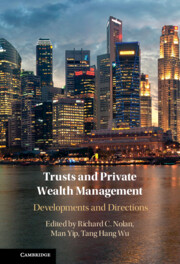Book contents
- Trusts and Private Wealth Management
- Trusts and Private Wealth Management
- Copyright page
- Contents
- Contributors
- Table of Cases
- Table of Legislation
- 1 Introduction
- 2 Family Trusts Today
- Part I The Rise of Asian Wealth
- Part II The Changing Legal Context
- 9 Trusts of Cryptoassets
- 10 Pragmatic Modernisation? Judicial Directions in Trusts and Wealth Management
- 11 Decision-Making in Trusts
- 12 Trustee Decision-Making in the Australian Superannuation Context
- 13 Trusts and UWOs
- 14 Constructive Trusts on Express Trusts
- 15 Abuse of Trust
- Index
13 - Trusts and UWOs
Unpacking the ‘Holding’ Requirement Puzzle
from Part II - The Changing Legal Context
Published online by Cambridge University Press: 08 December 2022
- Trusts and Private Wealth Management
- Trusts and Private Wealth Management
- Copyright page
- Contents
- Contributors
- Table of Cases
- Table of Legislation
- 1 Introduction
- 2 Family Trusts Today
- Part I The Rise of Asian Wealth
- Part II The Changing Legal Context
- 9 Trusts of Cryptoassets
- 10 Pragmatic Modernisation? Judicial Directions in Trusts and Wealth Management
- 11 Decision-Making in Trusts
- 12 Trustee Decision-Making in the Australian Superannuation Context
- 13 Trusts and UWOs
- 14 Constructive Trusts on Express Trusts
- 15 Abuse of Trust
- Index
Summary
Unexplained Wealth Orders (UWOs) are investigative tools brought in by the Criminal Finances Act 2017, which give new powers to the UK law enforcement authorities to fight money laundering. UWOs apply to individuals and other structures, e.g., trusts and companies, and require a respondent to explain the nature and extent of his interest in particular assets and how the assets were obtained. These orders further apply to assets located within and outside of the United Kingdom. This chapter examines the addition of UWOs to the arsenal of anti-money laundering measures in the United Kingdom. Compliance with a UWO will make further inroads on the privacy of trusts since information will have to be disclosed about the origin of the funds used to obtain specific trust assets. In addition, the Criminal Finances Act 2017 adopts a wide definition of persons taken to ‘hold’ trust property. This includes a ‘beneficiary, whether actual or potential’. Given the absence of any guidance provided by the 2017 Act, the chapter seeks to interrogate the meaning of ‘hold’ and determine when a discretionary beneficiary ought to be treated as ‘holding’ trust assets for the purposes of UWOs.
- Type
- Chapter
- Information
- Trusts and Private Wealth ManagementDevelopments and Directions, pp. 244 - 263Publisher: Cambridge University PressPrint publication year: 2022

